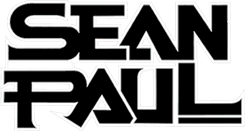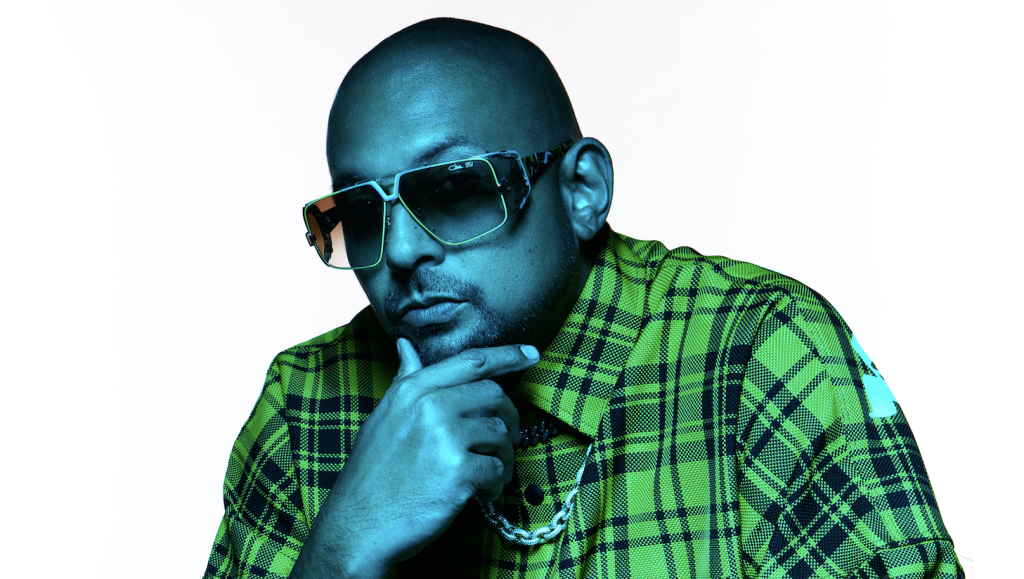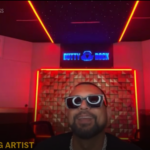Sean Paul Revisits His History & The Roots Of “Reggae Dancehall” In Chat About New Album ‘Scorcha’
Rocking aught-ly appropriate zigzag cornrows, dripped in green, gold, and black, and holding an old-school double cassette player decorated with stickers of Rastafari icon Emperor Haile Selassie and the King of Ska Prince Buster, Sean Paul put his Jamaican roots on full display when he graced the cover of VIBE back in December 2003.
Nearly 20 years later, the veteran deejay and self-described “elder statesman in the business” admits he’s pivoted toward a more Pop- and Dance-music-oriented sound versus the traditional Dancehall aesthetic of his 2002 Grammy Award-winning album Dutty Rock.
“I have bridged a gap where I’ve become successful at doing the usual thing but now it’s my own sound,” explained the 49-year-old. “I’ve always wanted the music to evolve and go somewhere without losing the roots.”
Born Sean Paul Ryan Francis Henriques in Kingston, Jamaica, his eighth album Scorcha dropped last Friday (May 27) and exemplifies the singjay’s artistic evolution.

The 16-track Island Records release includes collaborations with international and homegrown artists Ty Dolla $ign, Pia Mia, Jada Kingdom, Sia, Gwen Stefani, Shenseea, Tove Lo, Stylo G, Damian Marley, and Nicky Jam. To capture the eclecticism of the album’s featured artists and musical composition, Paul recruited Canadian producers Banx & Ranx, IzyBeats, Black Chiney alum Supa Dups, and his brother Jason “Jigzag” Henriques.
On the morning of April 25, I met with Sean Paul at the Mondrian Park Avenue hotel in Manhattan to discuss the new album, or so we thought. The conversation was effortless as we quickly found ourselves digging in the crates of his life and music, which I discovered in 1997 with his breakout single “Infiltrate.”
As we waxed poetic on the music, history, and culture of the Caribbean island—where he still lives with his wife and children—Paul seamlessly dropped names like Bob Marley, Peter Tosh, Capleton, and Sizzla bigging up both his predecessors and peers. He also had some tough-love advice for “the younger cats” and specifically praised female artists like Koffee, Spice, Ishawna, and Lila Iké for making their musical mark because “Reggae and Dancehall has been a male-dominated thing.”
The “I’m Still in Love With You” singer’s deep-rooted knowledge of and passion for Jamaican music is undeniable. For instance, he has hit songs on many groundbreaking and well-known riddims like the Playground, Bookshelf, Street Sweeper, Buzz, and Diwali to name just a few. Still, when asked, “What’s the one riddim you are not on, but wish you were?” he immediately responded, “I could name one off the top, Showtime. When I heard it, I was like, ‘Wow.’ You know what I mean? It’s a staple riddim. Very prolific riddim.”
Later that night, he took the stage for the first of two sold-out shows on the Brooklyn leg of his successful Scorcha Tour at Elsewhere in Bushwick. Showcasing showmanship and charisma comparable to that of the “Energy God” himself, Elephant Man, Dutty Paul solidified his “Reggae Dancehall” pedigree with lively performances of “Get Busy,” “Deport Dem,” “Go Down Deh,” “Dynamite,” and more. The jam-packed multigenerational and multicultural crowd perfectly represented the indefinable nature of Sean Paul’s musical and personal identity. Read on for VIBE’s exclusive interview.
VIBE: I don’t think a lot of people understand how ethnically and racially diverse Jamaica is so that a person like Sean Paul is not so uncommon. I think it’s important to shed some light on this because it’s a part of the culture and history. My understanding is your father is half Jewish, half Afro Jamaican, and your mother is half white English, half Chinese Jamaican. Can you please set the record straight?
Sean Paul: Yeah. My dad’s mom is mixed with Jamaican African, or I say Black people, and also white people. [As a child,] I said to him, “Dad, where do we come from?” He said [Henriques] was a Portuguese name, and we came on the ship with Columbus. They were horse thieves and got in trouble with Columbus. They were shipwrecked and stayed in Jamaica like, “We ain’t leaving.” And that’s 400 years of history.
We used to have jokes as kids, and people were like, “What are you?” And we used to say, “We are mongrel. Mix up.” When I look back, growing up sometimes people would cuss like, “Those people.” And I’m like, “But that’s my grandma.” And then other people would say, “Those people.” I’m like, “But that’s my uncs [uncle].”
There’s no way to put me in a box in that respect. Yes, some of our ancestors were slaves, some were slave drivers. But for me, I think, the type of person I am, I kind of encompass what Jamaica is—out of many, one people.
Thank you. Now, let’s talk about the music and the new album Scorcha. It has a very eclectic sound and features a ton of artists from different genres. How would you describe the album and what can fans expect?
The style on this album is totally me. Yes, I’ve done some changes to the work, but there’s also that root there. The way I spit on any track is definitely Dancehall-oriented, which came out of Reggae music. So, I like to describe the music that I do as Reggae Dancehall. For me, Dancehall is not just one thing. There’s many different topics.
And, so, I’ve chosen a path where it’s more fun-oriented. I’m showing maturity on this album with tracks like “Borrowed Time,” “Calling On Me,” and also, “No Fear.” They’re more thoughtful and mature topics. I’ve been criticized as carrying it too pop-y at times. I’ve been criticized as watering down the original sound. But when you’re a key player, you affect change.
I’ve always felt a lot of the people who say you don’t represent Dancehall don’t know the full scope of your catalog.
Or what Dancehall is.
Exactly. Dancehall is not just this monolithic thing.
There’s a lot of diversity, too.
And there always has been. That’s the beauty of it because it’s a mirror to the culture in every aspect, so you got to tell the good and the bad because life is never just one thing.
Exactly. We [artists] are supposed to be talking about what we are seeing. Some of the younger artists just stick to one topic. And, so, there must be some time that you’re not seeing a gun. You eat breakfast, right? You do some normal things in life, right? But those songs are not coming out. It’s just being embellished on one side, which I don’t think is fair to the music. I just hope the young listenership that’s following them and thinking only the hardcore stuff is Dancehall, get to appreciate the other assets.
There must be some time that you’re not seeing a gun…But those songs are not coming out. It’s just being embellished on one side, which I don’t think is fair to the music.”
Laa Lee’s lightening up the place. He’s not singing about gun or a hole inna head. He’s singing about a good time and having fun. And he’s making his own impact. So, that’s great. People like him and Tanto Blacks, their music is fun.
Yes, the catalogs of all the greats include well-versed content.
So, my criticism is the younger cats ain’t as versatile. Back in the day, you would have to be a more versatile artist. Artists like Buccaneer, he would do a bad man sound, then he’d do a reality sound. Spragga Benz, same thing, a girl song, and then a song that’s very spiritual, and then a bad man song. Shinehead could sing, he could rap, he could deejay, he could do it all. Now, Papa San, he would spit some reality and some very technical lyrics, and then he would spit something that was not technical at all and just very funny, like, “Lawd, mi cyaan tek it no more.”
I’m not burning them out. I think that you can’t burn out the kids because they are the future. But as an elder statesman in the business, you can guide them in a proper way.

Speaking of the new era of Dancehall, you worked with Shenseea on the song “Light My Fire.” Tell me about working with her again.
Shen is, to me, one of the most exciting things in Dancehall right now. And it’s so crazy, because she came and said something that disappointed me, but…
She said on her [Instagram] live that she was giving Dancehall five years, and she’s going to do her real love, which is Pop music. I called her a couple days later. I was like, “Yo, that kind of hurt me.” She’s like, “Well, me and you is always good.” And I’m like, “Yeah, but our culture needs our soldiers, and we have supported you up to this point, and we love you, Shen.” Because we’re at a point in Dancehall, where, in a few years, we could get pushed out of the way.
Me as a youngster, I would never diss a Shabba [Ranks], I’d never diss a Super Cat, or somebody who played a role in me getting where I am. And, so, by her saying, “I just was dabbling in Dancehall,” it really hurt because she’s an awesome artist.
I understand she wants to express herself because she is that talented. But, yet, I want to hear some more of what she was spitting on “Crocodile Teeth” on [Funk] Flex. I think a lot of people want to hear that.
What it was like also working with Gwen Stefani on the track?
She’s been awesome. She’s a dope artist. And she loves Reggae from long time.
She’s worked with some of the biggest names in the business—Bounty [Killer], Lady Saw, Busy Signal, Major Lazor, and now you! Can you speak on why she is so embraced by the culture and music?
Her son is named Kingston! She loves the vibes. She wears the colors, has the arm bands. I’m like, “Yo, she down with the movement.” She represents for the country. From her No Doubt days, she was coming [to Jamaica] to record. So, it impressed me that she wants to come to Jamaica. A lot of people do Reggae, a lot of people do Dancehall-oriented tracks, but they never come. She comes to Jamaica. She goes to the studio in Portland, and she grinds it out. They drink their Red Stripe and smoke a lickle ting. Yeah. And they catch a vibes.
If you want to do country music, you have to go to Nashville sometime. So, the mecca of it, the root of it is in Kingston, Jamaica.”
As a huge Gwen Stefani fan, I’m very excited about the release of this song.
Wicked.
—
With the conversation winding down, Paul went on to reveal why his five-year-old son is also anxious for the release of the three-way collaboration, which was co-written by Emily Warren and produced by KoOoLkOjAk, Alexander A.C Castillo Vasquez, and Jigzag. After seeing Stefani’s famous midriff in the video for “Let Me Blow Ya Mind,” the awestruck tot responded like most of us and simply said, “Her belly!”
“What you mean?” the father of two recalled asking his son who was just four at the time. “And he’s like, ‘Yo, I like her.’ And I’m like, ‘Yeah, I like her too. I did a song with her.’ He’s like, ‘For real?’ So, he can’t wait for this to come out either.”
Luckily for us all, the wait is over as Scorcha is available now to stream on Amazon Music, Apple Music, and Spotify. Listen to “Light My Fire Below.”
This interview has been edited for length and clarity.




